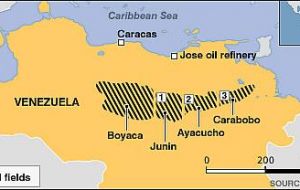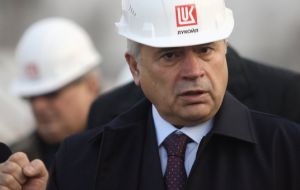MercoPress. South Atlantic News Agency
Russian oil giant wants to sell stake in Orinoco project and get out of Venezuela
 Lukoil is part of the Junin-6 consortium developing heavy oil in the Orinoco basin
Lukoil is part of the Junin-6 consortium developing heavy oil in the Orinoco basin Lukoil, Russia's second-biggest oil producer wants to sell its stake in a Russian consortium developing a large oil project in Venezuela because it is not a high priority, Lukoil's head said on Wednesday.
Venezuela is the world's 11th largest crude exporter but foreign companies operating there have faced price controls and currency devaluations along with threats of nationalisation, forcing several to quit the country.
Lukoil's exit could raise more questions about Venezuela's ambitious plans to boost stagnant output and the ability of the government to turn the promise of the Orinoco Belt into reality.
Lukoil is part of the Junin-6 consortium developing heavy oil in the Orinoco basin. The group is led by Russian state oil major Rosneft and also includes Gazprom Neft .
“We made an offer to the consortium to buy out our stake,” Vagit Alekperov told reporters. “This is not a project of a high priority for us.”
Surgutneftegas and TNK-BP, which was bought by Rosneft for 55 billion dollars earlier this year, have also decided to leave the consortium, citing a need to focus on domestic business.
The Junin-6 consortium owns a 40% stake in the project, which started production in September 2012, while Venezuela's state-run PDVSA has 60%.
“The consortium is falling apart ... The companies have understood the political risks and begun to leave the project, one by one,” Alexander Pasechnik, an analyst with the National Energy Security Fund think-tank in Moscow, said.
Some other companies have also taken flight from the Latin American country.
Last month, Malaysia's Petronas said it was exiting one of the biggest petroleum projects in the Orinoco Belt, after what sources close to the venture and within the firm said were disagreements with Venezuelan authorities and PDVSA.
Ties between Moscow and Caracas flourished under Hugo Chavez, the populist leader who died of cancer earlier this year to be succeeded by Nicolas Maduro, who won the presidential election in April and was Chavez's chosen successor.





Top Comments
Disclaimer & comment rules-

-

-

Read all commentsIt comes to something when the likes of Russia think you are too untrustworthy to do business with.
Oct 03rd, 2013 - 07:57 am 0The revolving door syndrome - Russia out ... China in.
Oct 03rd, 2013 - 11:42 am 0Or indeed, says Maduro, anybody with the money as long as its not the USA
Britworker:
Oct 03rd, 2013 - 01:22 pm 0Good point - Russia is very unclean on Corruption Perception Index, but Venezuela ranks even lower:
http://www.transparency.org/cpi2012/results
Coincidence that Lukoil getting out of Venezuela just as Russian government is pushing for huge new subsidies for its Arctic oil exploitation, as well as being willing to charge the Greenpeace activists for piracy in their failed attempt at putting up a banner on the Russian Arctic oil rig.
Much of Venezuela's heavy crude is so heavy that its classed as tar sands product and maybe the Russians just don't want the expense and political hassle that Canada is going through to develop its tar sands - now a huge part of Canada's international oil supply.
Commenting for this story is now closed.
If you have a Facebook account, become a fan and comment on our Facebook Page!